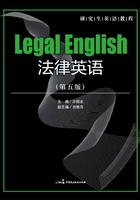
Ⅶ. Compare the legal terms in the brackets and then complete the sentences below.
1. When court once laid down a principle of law as applicable to a certain state of facts, it will adhere to the principle of ____(stare decisis/res judicata), and
apply it to all future cases, where facts are substantially the same; regardless of whether the parties and property are the same.
2. A judicial decision is said to be____ (reversed/overruled)when a later decision, rendered by the same court or by a superior court in the same system, expresses a judgment upon the same question of law directly opposite to that which was before given, thereby depriving the earlier opinion of all authority as a precedent.
3. The courts address a formal____ (petition/complaint)if a civil claim has established the Rule of Law or if a criminal claim has evidence to support an arrest warrant. A ____(petition/complaint)is less formal and may never reach a court.
4. The overall job of____ (trial courts/appellate courts)is to reach a decision in the first instance on all disputes filed in a given judicial system. This involves hearing the evidence and arguments presented by the parties, determining the facts in the case and applying the law to those facts.
5. Not all statements of legal principles by judges deciding a case are part of the____ (holding/dictum). A statement that is not necessary for decision of the case is called ____(holding/dictum)and can have no binding authority in a later case.
6. If a court is not obligated to follow precedents established in earlier cases, but may do so if it is persuaded by the reasoning used, the precedent is only ____(binding precedent/persuasive precedent). The decision of a legal question by the courts of one state will have only persuasive effect on the courts of another state.
7. The term“____ ”(statute/judge-made law)is more commonly used as meaning, simply, the law established by judicial precedent and decisions as opposed to laws having their source in____ (statute/judge-made law)or administrative regulations.
8. ____(Private law/Public law)is a general classification of law, consisting generally of constitutional, administrative, criminal and international law, concerned with the organization of the state, the relations between the state and the people who compose it, the responsibilities of public officers to the state, to each other, and to private persons, and the relations of states to one another.
9. An injunction is a/an ____(legal remedy/equitable remedy)in the form of a court order that compels a party to do or refrain from specific acts.A party that fails to comply with an injunction faces criminal or civil penalties, including possible monetary sanctions and even imprisonment.They can also be charged with contempt of court.
10. ____(Common law/Civil law)judges see statutes as containing specific rules of law that will be applied fairly according to their terms, but not beyond;while courts in ____(common law/civil law)systems treat the codes as containing germinating principles from which specific rules can be generated.